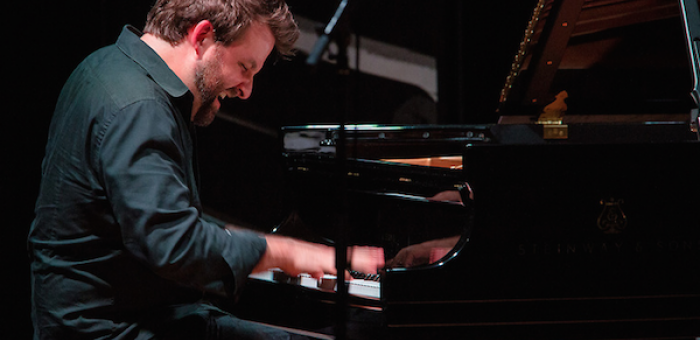Jan 13, 2026 2:09 PM
More Trump-Kennedy Center Cancellations
The fallout from the renaming of the John F. Kennedy Center for the Performing Arts to include President Donald…

Taylor Eigsti performs during the Irving S. Gilmore International Keyboard Festival in Kalamazoo, Michigan, on May 12.
(Photo: Chris McGuire)In the first of two sold-out sets at Bell’s Eccentric Café in Kalamazoo, Michigan, the Irving S. Gilmore International Keyboard Festival welcomed back Taylor Eigsti on May 12. The dynamic pianist had previously performed at the Gilmore back in 2002, when he was all of 17 years old. (This reviewer attended that daytime show and was impressed by the youngster’s composure and finesse.)
Fast-forward 14 years, with an evening crowd, and the 31-year-old Eigsti commanding his trio. But he did so in such a complementary way one could almost forget who was in charge, were it not for the leader’s frequent comments to the audience. The rapport between the pianist and his longtime bandmates—bassist Harish Raghavan and drummer Eric Harland—was mighty impressive, the energy palpable.
Beginning with Ornette Coleman’s “Turnaround,” the trio’s approach was methodical and measured on this medium-tempo swinger. Eigsti built his solo slowly, climaxing with a cluster of chords that were both insistent and full of energy. Indeed, at points he resorted to making fists as he banged on the keys, providing more emphasis and deepening the blues feeling.
Raghavan responded with some chunky chords of his own, his playing also full of intensity. Harland offered a contrasting light touch that displayed a taut effervescence.
Wayne Shorter’s “Deluge” (from 1965’s JuJu) continued the saxophone-oriented standards theme. This rendition was another medium-tempo swinger, with Eigsti providing more fulsome chordal work opposite a bounty of aggressive, right-hand notes. With Raghavan once again following the pianist’s solo as if in pursuit, the bassist was all over his instrument, his wrenching facial expressions keeping pace with his kinetic hands.
The eventual result was a trio exercise, where all three members seemed to be soloing simultaneously.
Eigsti’s affection for Dave Brubeck was expressed with an interpretation of the legend’s “Strange Meadow Lark.” The pianist’s solo introduction trimmed Brubeck’s elongated original intro en route to more true-to-form medium-tempo swing music. Raghavan and Harland put their own stamps on this standard but without the playful flair provided by their counterparts on the 1959 original version.
“Magnolia,” an original number from Eigsti’s 2010 album, Daylight At Midnight (Concord), followed. It’s a tune that Eigsti co-wrote with singer-songwriter Becca Stevens, who contributed vocals to it. Here at the Gilmore, this slow, impressionistic song floated between backbeats inside a lilting waltz, and all three players delivered solos.
This more contemplative mood was furthered with the trio’s take on another standard, “Here’s That Rainy Day.” The modal sauntering was enhanced by Raghavan’s delicate, patient bass solo, which mirrored the song’s plaintive mood—here on what was, in fact, a rainy night in Kalamazoo. Toward the song’s conclusion, the trio double-timed the tempo only to return to the theme’s original pace, with Harland’s mallets played at both ends to accent the song’s shifting colors.
Keyboardist/composer Rachel Flowers’ “Greg’s Favorite” was a natural follow-up. The song became an exploration in rhythm for the trio and a showcase for Harland, this now-modal piece gradually dishing up the only funkiness of the set.
A meditation on love lost, Leonard Bernstein’s “Some Other Time” (from the 1944 musical On The Town) became another modal offering, accented with a slightly ominous overlay.
The rhythmically challenging “Caravan” was typically frenetic, played with a tight arrangement and lots of chops on display from Harland. As if on cue, a nearby train was suddenly heard, its insistent horn blaring. (Harland’s priceless facial expression in response to the approaching engine suggested wonder combined with a little concern.) The linkage between the pianist and the drummer became a true dialog inside a blizzard of notes and beats.
Finishing with a solo piano encore of “If Ever I Would Leave You,” Eigsti seemed to be offering a gracious nig

Belá Fleck during an interview with Fredrika Whitfield on CNN.
Jan 13, 2026 2:09 PM
The fallout from the renaming of the John F. Kennedy Center for the Performing Arts to include President Donald…

Peplowski first came to prominence in legacy swing bands, including the final iteration of the Benny Goodman Orchestra, before beginning a solo career in the late 1980s.
Feb 3, 2026 12:10 AM
Ken Peplowski, a clarinetist and tenor saxophonist who straddled the worlds of traditional and modern jazz, died Feb. 2…

The success of Oregon’s first album, 1971’s Music Of Another Present Era, allowed Towner to establish a solo career.
Jan 19, 2026 5:02 PM
Ralph Towner, a guitarist and composer who blended multiple genres, including jazz — and throughout them all remained…

Rico’s Anti-Microbial Instrument Swab
Jan 19, 2026 2:48 PM
With this year’s NAMM Show right around the corner, we can look forward to plenty of new and innovative instruments…

Richie Beirach was particularly renowned for his approach to chromatic harmony, which he used to improvise reharmonizations of originals and standards.
Jan 27, 2026 11:19 AM
Richie Beirach, a pianist and composer who channeled a knowledge of modern classical music into his jazz practice,…